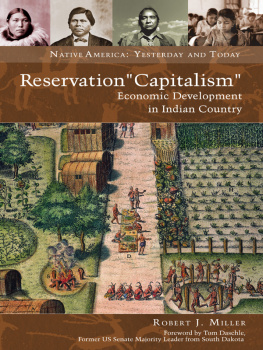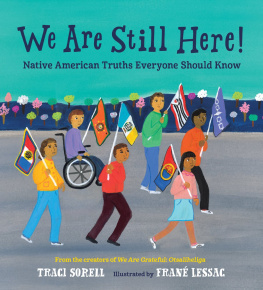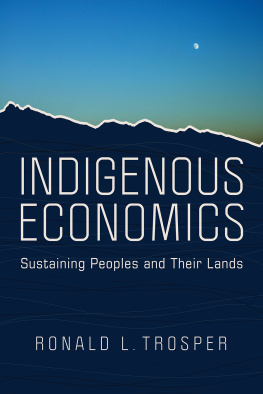I dedicate this book to my parents, James B. Miller and Hazel L. Miller (Captain). My dad taught me everything I know about small family businesses during the time I worked for him from 19681987 at Jim Miller's Used Cars, Inc., in Portland, Oregon. He created and operated his business for nearly 52 years from 1946 to the very day he died in 1997. My mom taught me about economics, budgeting, and the value of a dollar. She provided the seed money to start our family business by working in the Portland shipyards during World War II as a riveter and welder, and she also did the bookkeeping for the company for its first seven or eight years of existence. I owe them everything I am today.
I also gratefully acknowledge all the people who made this book possible and assisted me and supported me in seeing it to completion: Molly Smith, Leslie Miller, and Amanda Breunig. I thank Professor Alex Skibine, Steve Bahnson, and Jean Edwards for reading and commenting on earlier drafts of the book.
I also thank the people who generously gave me their time in interviews and personal conversations: Chief Glenna Wallace, Second Chief Jack Ross, Chairman Antone Minthorn, Chairman Clifford Lyle Marshall, Chief Charles Enyart, Danny Captain, Howard Birdsong, Danny Jordan, Jolanda Ingram-Marshall, Chairman Duane Sherman, Gary George, Kathleen Flanagan, Bill Tovey, Roberta Conner, and Tom Hampson.
I also thank Lynn Williams of the Lewis & Clark Law School Library, who endured years of countless requests from me for various research sources.
Selected Bibliography
Only my primary sources are listed here. Please refer to the chapter endnotes for citations to all the materials I relied on.
Articles
Haddock, David D., & Robert J. Miller, Can a Sovereign Protect Investors from Itself? Tribal Institutions to Spur Reservation Investment, 8 J. Small & Emerging Bus. L. 173 (2004).
Jorgensen, Joseph, Sovereignty and the Structure of Dependency at Northern Ute, 10 Am. Ind. Culture & Research J. 7594 (1986).
Miller, Robert J., American Indian Entrepreneurs: Unique Challenges, Unlimited Potential, 40 Arizona St. L.J. 1297 (2008).
Miller, Robert J., Inter-tribal and International Treaties for American Indian Economic Development, 12 Lewis & Clark L. Rev. 1103 (2008).
Miller, Robert J., Economic Development in Indian Country: Will Capitalism or Socialism Succeed?, 80 Oregon L. Rev. 757 (2001).
Pascal, Vincent J., & Daniel Stewart, The Effects of Location and Economic Cluster Development on Native American Entrepreneurship, 9 Entrepreneurship and Innovation 121131 (2008).
Books
American Encounters: Natives and Newcomers from European Contact to Indian Removal, 15001850, Peter C. Mancall & James H. Merrell, eds. (New York: Routledge, 2000).
American Indian Policy in the Twentieth Century, Vine Deloria, Jr., ed. (Norman: University of Oklahoma Press, 1985).
American Indian Policy: Self-Governance and Economic Development, Lyman H. Legters & Fremont J. Lyden, eds. (Westport, CT: Greenwood, 1994).
Anderson, Terry L., Sovereign Nations or Reservations? An Economic History of American Indians (San Francisco: Pacific Research Institute, 1995).
Blomstrom, Magnus, & Bjorn Hettne, Development Theory in Transition: The Dependency Debate & Beyond: Third World Responses (London: Zed Books Ltd., 1984).
Challenges for Rural America in the 21st Century, David L. Brown & Louis Swanson, eds. (University Park: The Pennsylvania State University Press, 2003).
De Soto, Hernando. The Mystery of Capital: Why Capitalism Triumphs in the West and Fails Everywhere Else (New York: Basic Books, 2000).
Economic Development in American Indian Reservations, Roxanne Dunbar Ortiz, ed. (Albuquerque: University of New Mexico, 1979).
Ferrara, Peter J., The Choctaw Revolution: Lessons for Federal Indian Policy (Washington, DC: Americans for Tax Reform Foundation, 1998).
Frantz, Klaus, Indian Reservations in the United States: Territory, Sovereignty, and Socioeconomic Change (Chicago: University of Chicago Press, 1999).
Guyette, Susan, Planning for Balanced Development: A Guide for Native American and Rural Communities (Santa Fe, NM: Clear Light Publishers, 1996).
Haberfeld, Steven, A Self-Help Manual for Tribal Economic Development (Boulder, CO: Native American Rights Fund, 1982).
The Harvard Project on American Indian Economic Development, The State of the Native Nations: Conditions under U.S. Policies of Self-Determination (New York: Oxford University Press, 2008).
The Hidden Half: Studies of Plains Indian Women, Patricia Albers & Beatrice Medicine, eds. (New York: University Press of America, 1983).
Hosmer, Brian C., American Indians in the Marketplace: Persistence and Innovation Among the Menominees and Metlakatlans, 18701920 (Lawrence: University of Kansas Press, 1999).
Jobs and Economic Development in Minority Communities, Paul Ong & Anastasia Loukaitou-Sideris, eds. (Philadelphia: Temple University Press, 2006).
Mancall, Peter C., Valley of Opportunity: Economic Culture along the Upper Susquehanna, 17001800 (Ithaca, NY: Cornell University Press, 1991).
Miller, Robert J., Native America, Discovered and Conquered: Thomas Jefferson, Lewis & Clark, and Manifest Destiny (Lincoln: University of Nebraska Press, 2008).
Miner, H. Craig, The Corporation and the Indian: Tribal Sovereignty and Industrial Civilization in Indian Territory, 18651907 (Columbia, MO: University of Missouri Press, 1976).
Native Americans and Wage Labor, Alice Littlefield and Martha C. Knack, eds. (Norman: University of Oklahoma Press, 1996).
Native Pathways: American Indian Culture and Economic Development in the Twentieth Century, Brian Hosmer & Colleen ONeill, eds. (Boulder: University Press of Colorado, 1988).
New Directions in American Indian History, Colin G. Calloway, ed. (Norman: University of Oklahoma Press, 1988).
The Other Side of the Frontier: Economic Explorations into Native American History, Linda Barrington, ed. (Boulder, CO: Westview Press, 1999).
Pickering, Kathleen, Mark H. Harvey, Gene F. Summers, & David Mushinski, Welfare Reform in Persistent Rural Poverty (University Park: The Pennsylvania State University Press, 2006).
The Political Economy of North American Indians, John H. Moore, ed. (Norman: University of Oklahoma Press, 1993).
Property Rights and Indian Economies, Terry L. Anderson, ed., (Lanham, MD: Rowman and Littlefield, 1992).
Prucha, Francis Paul, The Great Father: The United States Government and the American Indians (Lincoln: University of Nebraska Press, 1995).
Public Policy Impacts on American Indian Economic Development, C. Matthew Snipp, ed. (Albuquerque: University of New Mexico Press, 1988).







